
Munich: The Heart of Bavaria
Munich, the capital of Bavaria, is a city that blends traditional charm with modern sophistication. Known for its rich history, stunning architecture, and vibrant cultural scene, Munich promises an unforgettable experience for every visitor. From the fairy-tale-like Nymphenburg Palace to the bustling Marienplatz, the city offers a captivating journey through time and culture. Stroll through the English Garden, one of the largest urban parks in the world, where you can relax by the serene lakes or watch surfers ride the waves on the Eisbach River. Munich's renowned beer gardens and halls, such as the legendary Hofbräuhaus, provide the perfect opportunity to savor authentic Bavarian cuisine and world-famous beers. The city's museums, including the Deutsches Museum and the Pinakothek galleries, are treasure troves of art and science. During the festive season, Munich transforms into a winter wonderland with its enchanting Christmas markets. And, of course, there's Oktoberfest, the world's largest beer festival, which attracts millions of visitors each year to celebrate Bavarian culture in grand style.
Local tips in Munich
- Visit early in the morning to beat the crowds at popular sites like Marienplatz and Nymphenburg Palace.
- Use public transport, such as the U-Bahn and S-Bahn, which are efficient and cover all major attractions.
- Try local specialties like Weisswurst and pretzels for an authentic Bavarian culinary experience.
- If attending Oktoberfest, book your accommodation well in advance as hotels fill up quickly.
- Take a day trip to nearby attractions such as Neuschwanstein Castle or the Dachau Concentration Camp Memorial Site.
- Learn a few basic German phrases; while many locals speak English, they appreciate the effort to speak their language.
Neighbourhoods in Munich
Munich: The Heart of Bavaria
Munich, the capital of Bavaria, is a city that blends traditional charm with modern sophistication. Known for its rich history, stunning architecture, and vibrant cultural scene, Munich promises an unforgettable experience for every visitor. From the fairy-tale-like Nymphenburg Palace to the bustling Marienplatz, the city offers a captivating journey through time and culture. Stroll through the English Garden, one of the largest urban parks in the world, where you can relax by the serene lakes or watch surfers ride the waves on the Eisbach River. Munich's renowned beer gardens and halls, such as the legendary Hofbräuhaus, provide the perfect opportunity to savor authentic Bavarian cuisine and world-famous beers. The city's museums, including the Deutsches Museum and the Pinakothek galleries, are treasure troves of art and science. During the festive season, Munich transforms into a winter wonderland with its enchanting Christmas markets. And, of course, there's Oktoberfest, the world's largest beer festival, which attracts millions of visitors each year to celebrate Bavarian culture in grand style.
When is the best time to go to Munich?
Iconic landmarks you can’t miss
Marienplatz
Experience the vibrant heart of Munich at Marienplatz, a stunning square brimming with history, culture, and Bavarian charm.
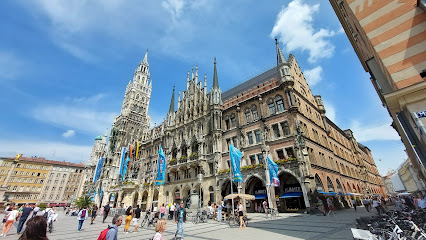
Olympiapark München
Discover the breathtaking beauty and cultural significance of Olympiapark München, a must-visit destination blending nature, history, and recreation.
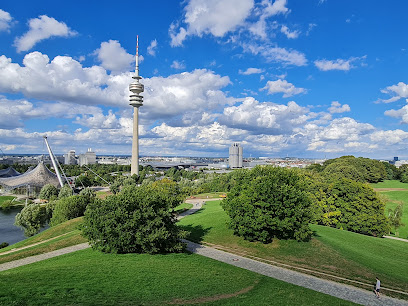
English Garden
Explore Munich's English Garden, one of the world's largest urban parks, offering nature, culture, and relaxation in a picturesque setting.
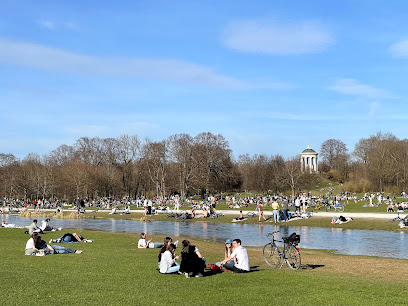
Viktualienmarkt
Explore the heart of Munich at Viktualienmarkt, a vibrant farmers' market filled with fresh produce, gourmet delights, and rich Bavarian culture.
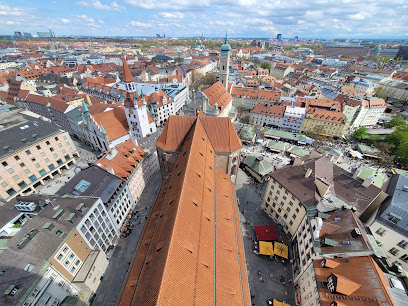
BMW Museum
Discover the history and future of automotive excellence at Munich's BMW Museum, a must-visit for car enthusiasts and tech lovers alike.
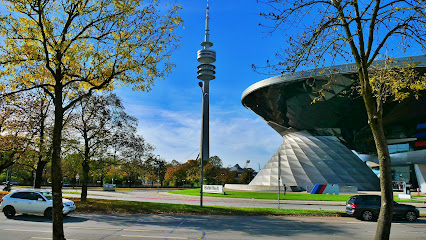
Nymphenburg Palace
Explore the grandeur of Nymphenburg Palace, Munich's exquisite baroque castle with lush gardens and rich royal history, perfect for all history enthusiasts.
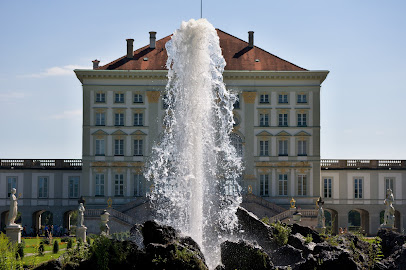
Odeonsplatz
Discover Odeonsplatz, Munich's historical square, where culture, architecture, and vibrant city life come together in a stunning setting.
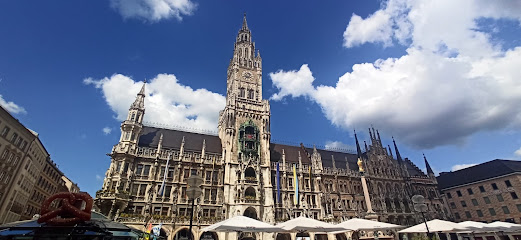
Munich Residenz
Discover the majestic Munich Residenz, a symbol of Bavarian royalty and architectural brilliance, merging history with stunning artistry.
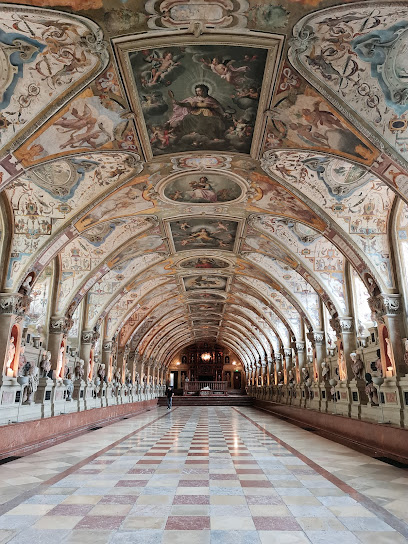
Frauenkirche
Explore the stunning Frauenkirche, Munich's iconic Catholic cathedral known for its majestic twin towers and rich architectural history.
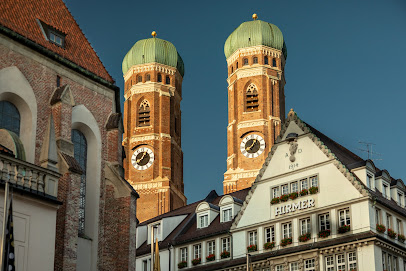
Olympiaturm
Experience breathtaking views and rich history at Olympiaturm, a must-visit landmark in Munich's iconic Olympiapark.
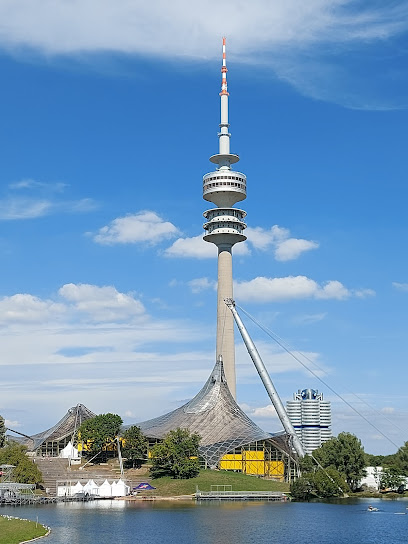
Alte Pinakothek
Discover the artistic magnificence of the Alte Pinakothek, Munich's premier art museum featuring masterpieces from the Renaissance to the Rococo era.
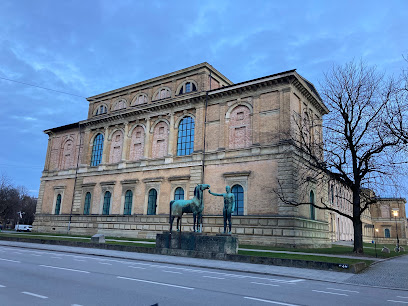
Isar Gate
Explore the historic Isar Gate in Munich, a beautiful landmark that combines medieval architecture with engaging cultural experiences.
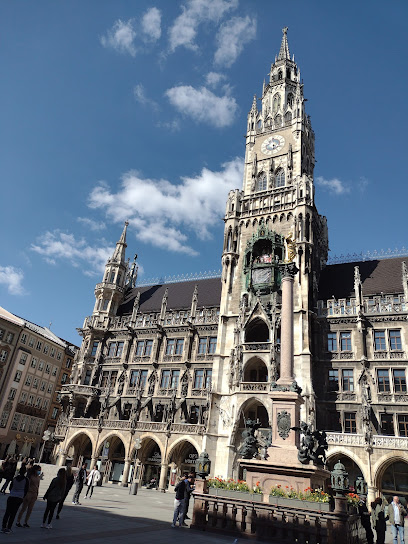
Hofgarten
Discover the tranquility of Hofgarten, a historic park in Munich blending nature, culture, and relaxation in a picturesque setting.
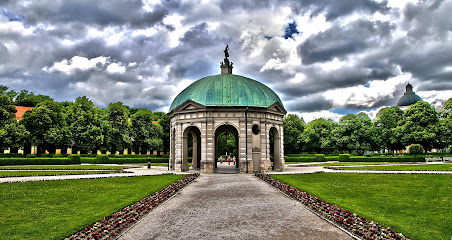
Königsplatz
Explore the beauty and historical significance of Königsplatz, Munich's neoclassical gem, surrounded by art and culture.
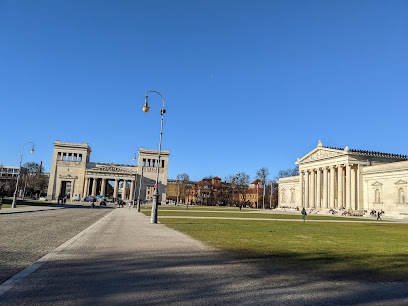
Flaucher
Flaucher: A picturesque park along the Isar River in Munich, perfect for relaxation, nature walks, and outdoor activities.
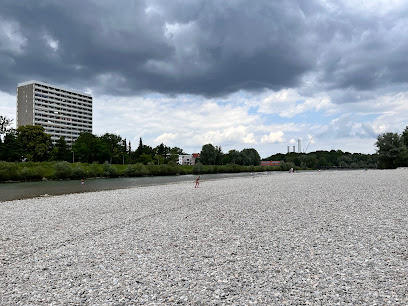
Unmissable attractions to see
Allianz Arena
Discover the architectural wonder of Allianz Arena, Munich's premier stadium, home to thrilling sports events and captivating concerts.
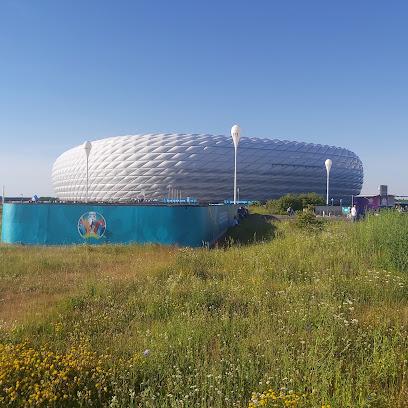
Olympiapark München
Discover Olympiapark München, a blend of stunning landscapes and vibrant events, perfect for relaxation and exploration in the heart of Munich.
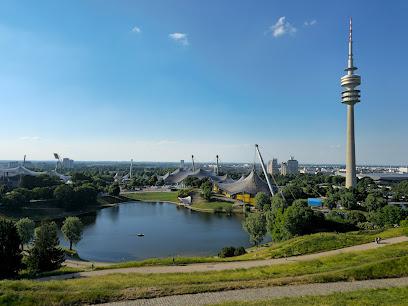
English Garden
Experience the vast beauty of Munich's English Garden, a perfect blend of nature, recreation, and local culture in one of the world's largest urban parks.
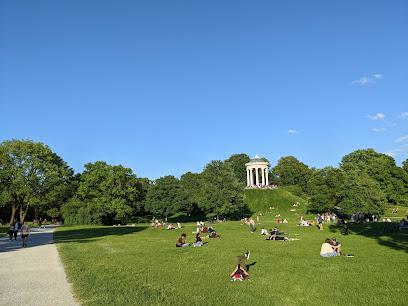
BMW Museum
Discover the history and innovation of BMW at the BMW Museum in Munich - a top destination for automotive enthusiasts and curious travelers alike.
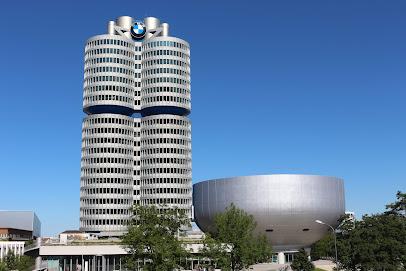
Hellabrunn Zoo
Explore Hellabrunn Zoo in Munich, a unique geo-zoo with diverse wildlife and conservation efforts, perfect for families and animal lovers alike.
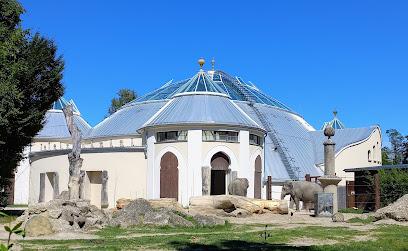
Deutsches Museum
Explore the Deutsches Museum in Munich, where science meets creativity and innovation in a captivating journey through technology's evolution.
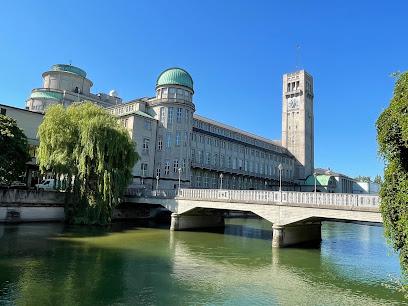
BMW Welt
Discover the architectural marvel of BMW Welt in Munich, where automotive innovation meets cultural experience in an unforgettable setting.
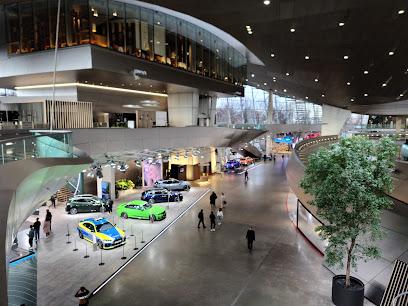
Nymphenburg Palace
Explore the opulent Nymphenburg Palace, a stunning baroque masterpiece in Munich surrounded by beautiful gardens and rich Bavarian history.
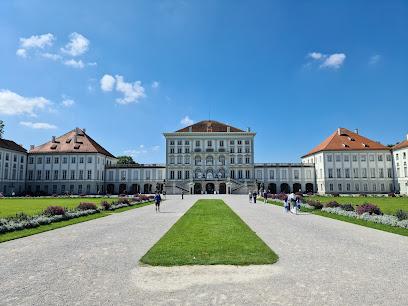
Karlsplatz
Discover the vibrant heart of Munich at Karlsplatz, a historic plaza blending culture, shopping, and Bavarian charm in one bustling location.
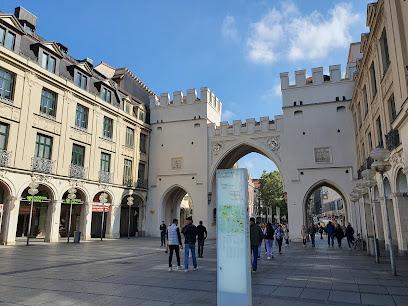
Eisbachwelle
Experience the thrill of urban surfing at Eisbachwelle, Munich's iconic river wave in the heart of the city.
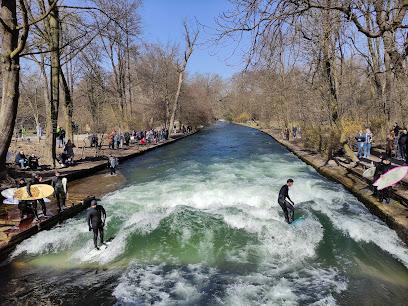
Odeonsplatz
Explore the historical and architectural wonders of Odeonsplatz, Munich's vibrant market square offering culture, beauty, and rich history.
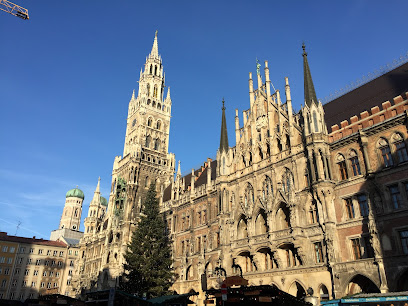
Munich Residence
Explore the stunning Munich Residence, a UNESCO World Heritage site, and delve into Bavaria's royal history through its exquisite art and architecture.
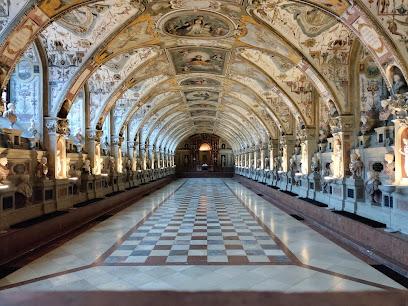
Andechs Monastery
Discover the serene charm of Andechs Monastery, a stunning pilgrimage site with breathtaking views and world-renowned Bavarian beer.
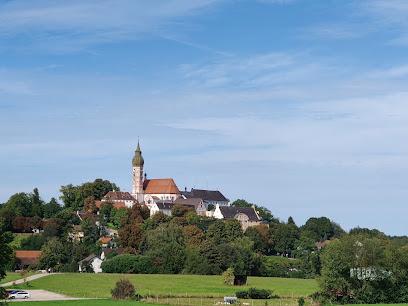
Biergarten am Chinesischen Turm
Experience Bavarian culture at Biergarten am Chinesischen Turm, a historic landmark in Munich's Englischer Garten, where beer, food, and relaxation await.
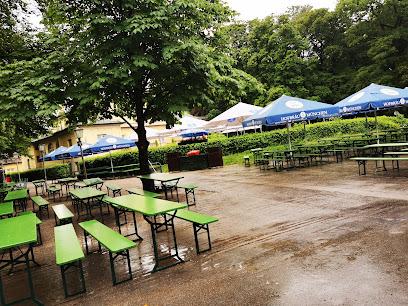
Frauenkirche
Explore the stunning Frauenkirche, Munich's iconic Gothic cathedral, and immerse yourself in its rich history and breathtaking architecture.
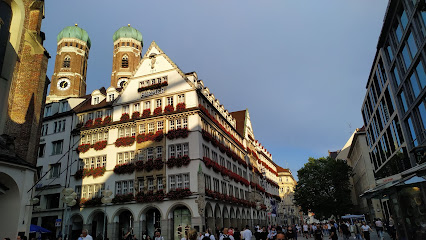
Essential places to dine
Augustiner Klosterwirt
Experience authentic Bavarian flavors at Augustiner Klosterwirt—Munich's beloved restaurant serving traditional German dishes and local brews.
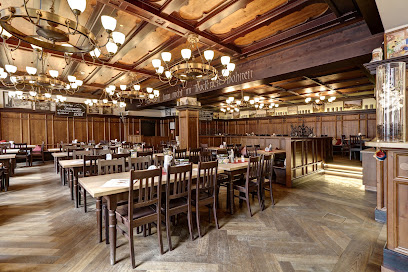
Ratskeller München
Discover authentic Bavarian cuisine and warm hospitality at Ratskeller München, located beneath the iconic city hall.
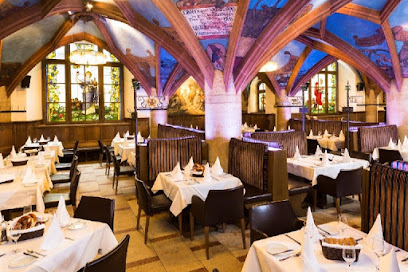
Andy's Krablergarten
Experience authentic Bavarian cuisine at Andy's Krablergarten in Munich – where tradition meets flavor in every dish.
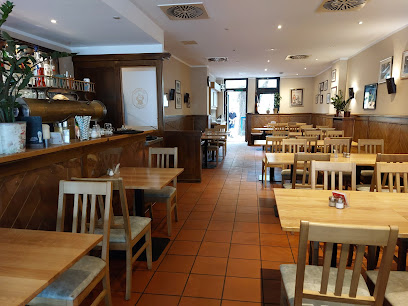
Steinheil 16
Experience authentic Bavarian cuisine at Steinheil 16 in Munich - where tradition meets flavor in every dish.
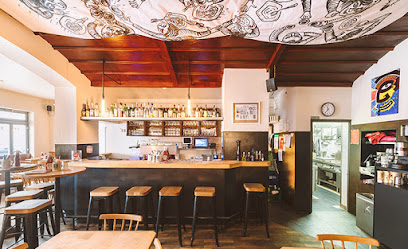
Münchner Stubn
Experience authentic Bavarian flavors at Münchner Stubn in Munich - where tradition meets taste in every dish.
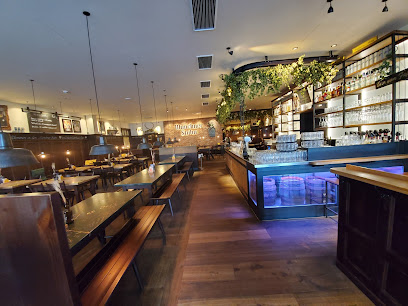
Spatenhaus at the opera
Experience authentic Bavarian cuisine at Spatenhaus at the Opera, where tradition meets elegance in the heart of Munich.
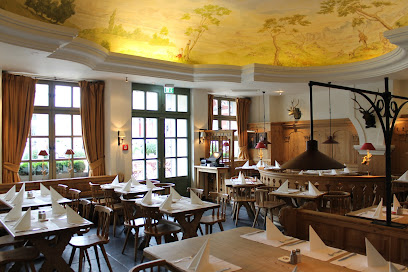
Wirtshaus in der Au
Experience authentic Bavarian cuisine at Wirtshaus in der Au - where tradition meets taste in the heart of Munich.
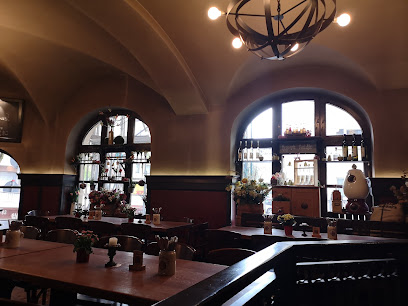
Brenner Restaurant
Experience exquisite Mediterranean cuisine at Brenner Restaurant in Munich - where flavor meets elegance in every dish.
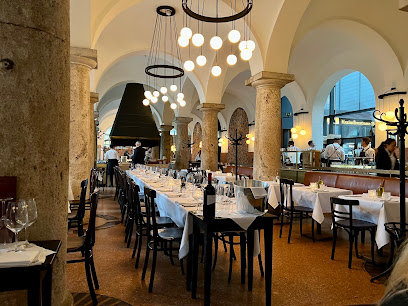
Zum Dürnbräu
Discover the heart of Bavarian cuisine at Zum Dürnbräu - where tradition meets flavor in every dish.
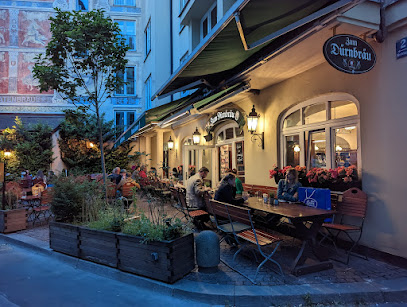
Ayinger am Platzl
Discover authentic Bavarian flavors at Ayinger am Platzl – a family-friendly restaurant with a charming beer garden atmosphere in Munich.
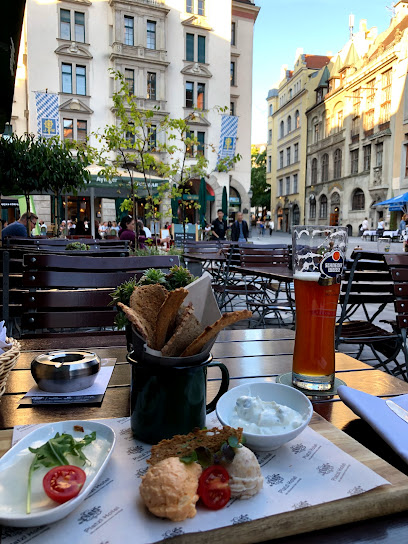
Little London / Bar & Grill
Discover Little London in Munich: Where exquisite steaks meet masterfully crafted cocktails in an elegant setting.
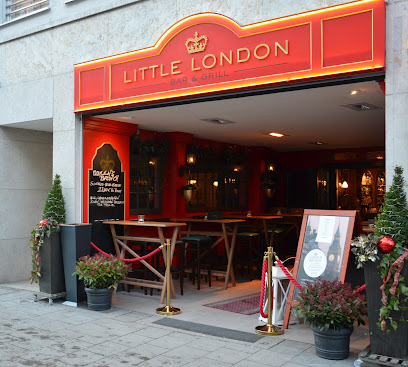
Zum Brünnstein
Experience authentic Bavarian cuisine at Zum Brünnstein in Munich—where tradition meets taste in every delightful dish.
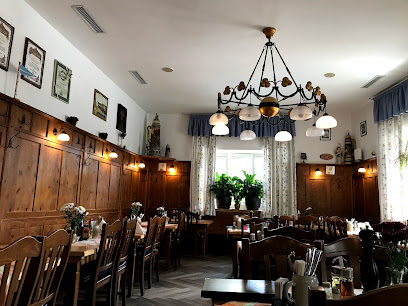
Chopan - near Gasteig
Discover the authentic flavors of Afghanistan at Chopan - a cozy Middle Eastern restaurant in Munich's Au-Haidhausen district.
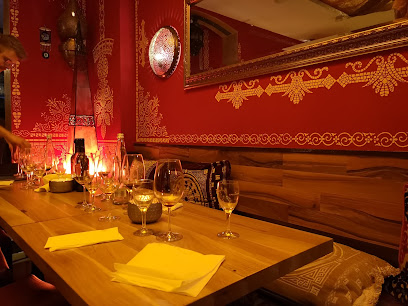
Bratwurstherzl
Experience authentic Bavarian cuisine at Bratwurstherzl in Munich - home to delicious bratwursts and traditional German dishes.
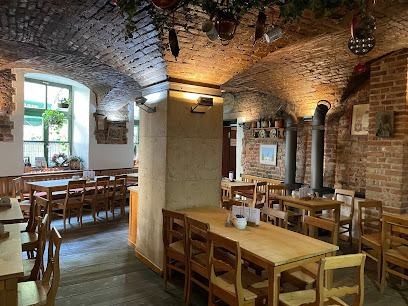
Restaurant Savanna Munich
Experience authentic South African cuisine at Restaurant Savanna in Munich – where flavor meets tradition in a cozy atmosphere.
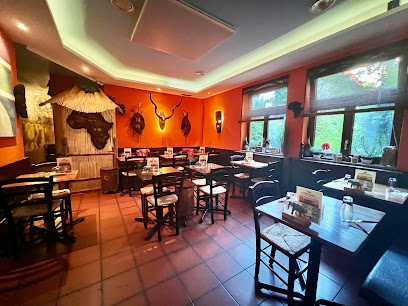
Markets, malls and hidden boutiques
GALERIA München Marienplatz
Shop in style at GALERIA München Marienplatz, the ultimate destination for fashion, gifts, and gourmet treats in the heart of Munich.

Fünf Höfe
Discover Fünf Höfe, Munich's chic shopping mall featuring high-end boutiques, art galleries, and delightful eateries in a stunning urban setting.
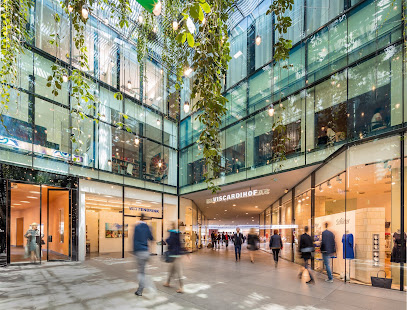
Hofstatt
Discover Hofstatt, Munich's vibrant shopping mall blending local markets with modern retail for a unique urban experience.
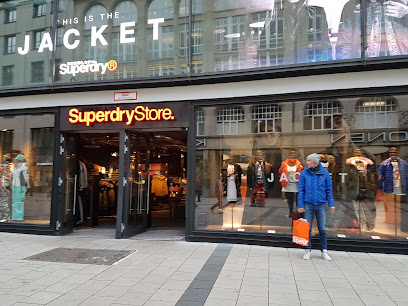
Kaufingertor Passage
Explore Kaufingertor Passage in Munich for an unforgettable shopping and dining experience that captures the vibrant spirit of the city.
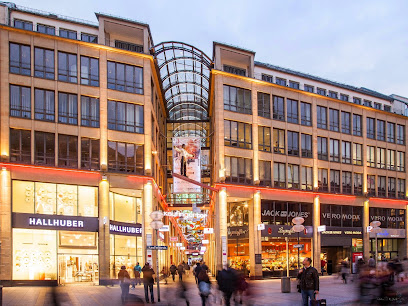
Deutsches Museum Shop GmbH
Explore the Deutsches Museum Shop for unique souvenirs and books celebrating the wonders of science and technology in Munich.
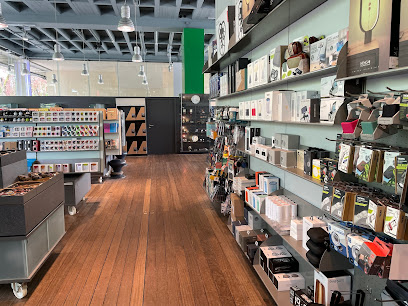
Urban Outfitters
Explore Urban Outfitters in Munich for the latest fashion, unique gifts, and trendy home goods in a vibrant shopping atmosphere.
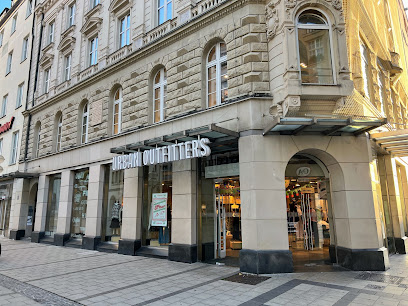
Elbenwald
Discover a magical world of gifts and collectibles at Elbenwald, Munich's premier destination for fantasy and pop culture enthusiasts.
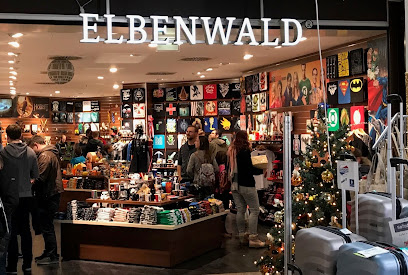
Picknweight - Vintage Store Kilo
Explore sustainable fashion at Picknweight - Vintage Store Kilo in Munich, where every piece has a story and style meets sustainability.
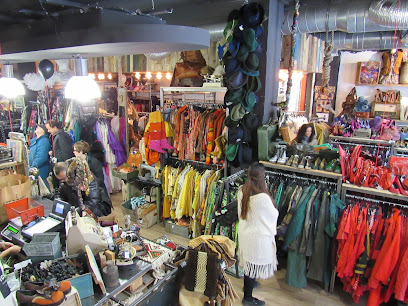
Chanel
Discover the elegance of Chanel in Munich - a luxurious shopping experience in the heart of Bavaria's fashion scene.
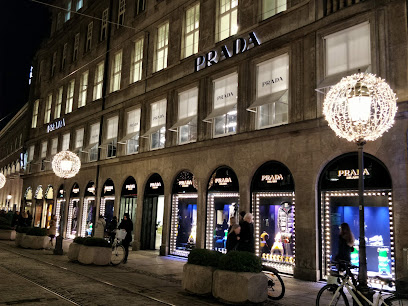
DIOR Munich Maximilianstrasse Store
Discover the elegance of DIOR in Munich, where luxury fashion meets timeless sophistication in a stunning boutique setting.
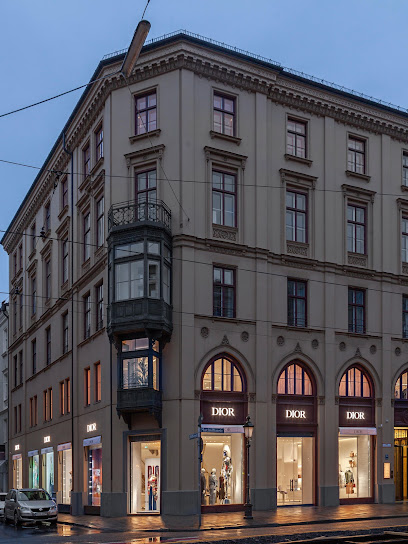
Max Krug
Discover unique souvenirs and local crafts at Max Krug, a charming gift shop in the heart of Munich, perfect for every traveler.
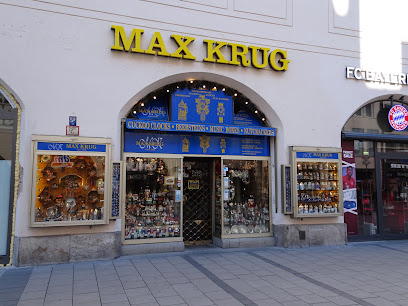
PRADA Munich Store
Discover the elegance and luxury of PRADA Munich, where high fashion meets exceptional craftsmanship in a stunning boutique setting.
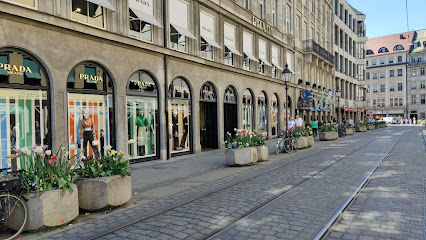
hessnatur Store Munich
Explore the hessnatur Store in Munich for eco-friendly clothing and sustainable fashion that caters to the whole family in a vibrant shopping atmosphere.
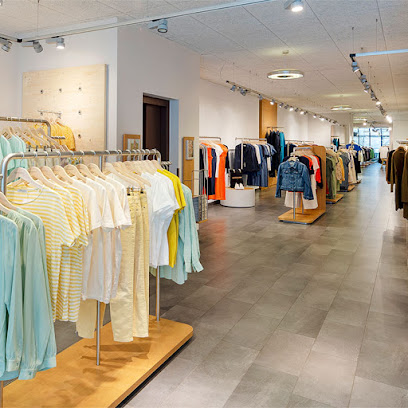
APROPOS - The Concept Store
Explore APROPOS - The Concept Store in Munich for a fashionable blend of clothing, cosmetics, and perfumes in a chic atmosphere.
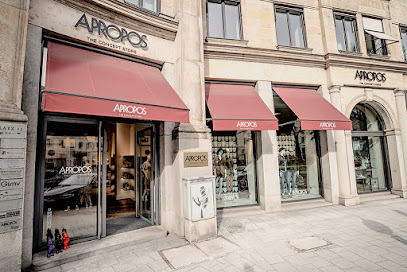
weißglut concept store
Explore the innovative design and unique products at weißglut Concept Store in Munich's trendy Schwabing district.
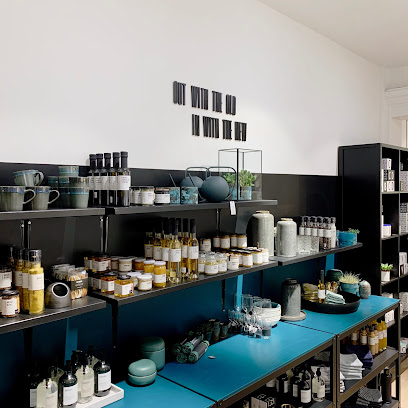
Essential bars & hidden hideouts
Pusser's
Discover the vibrant nightlife at Pusser's, Munich's premier cocktail bar with live music and an unforgettable atmosphere.
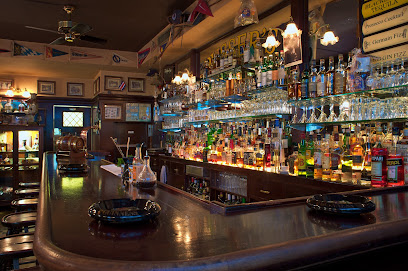
Die Goldene Bar
Experience the luxurious ambiance and exquisite cocktails at Die Goldene Bar, a must-visit destination for nightlife enthusiasts in Munich.
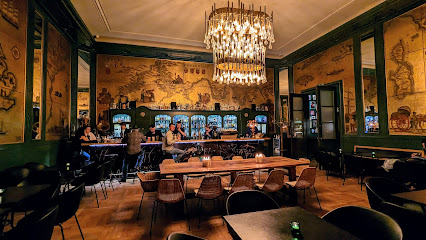
Zephyr Bar
Discover Zephyr Bar, Munich's premier cocktail destination, where innovative mixology and a vibrant atmosphere await every night.
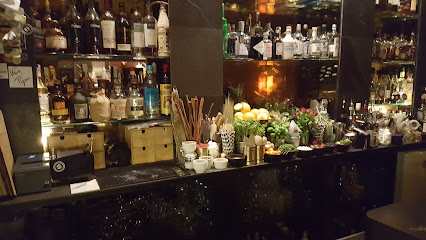
Havana Club
Discover the vibrant nightlife of Munich at Havana Club, where cocktails, music, and great company fuse for an unforgettable experience.
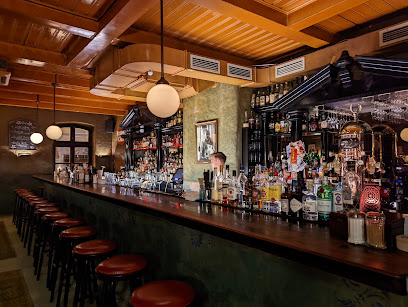
The Boilerman Bar - München
Discover a vibrant cocktail haven at The Boilerman Bar in Munich, where unique drinks and a cozy atmosphere await.
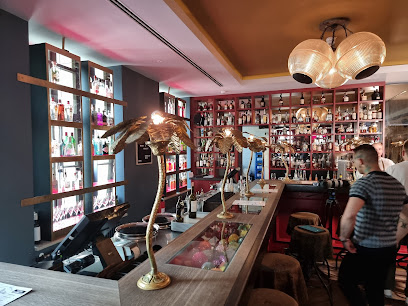
Jaded Monkey
Discover the vibrant nightlife at Jaded Monkey, Munich's go-to bar for expertly crafted cocktails and a lively social scene.
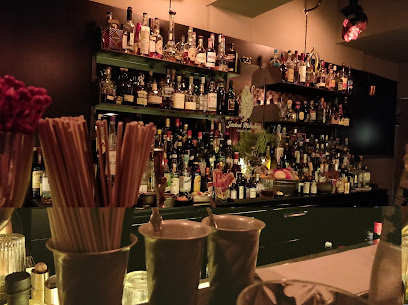
Auroom
Discover Auroom, Munich's upscale cocktail bar, where creativity meets elegance in an unforgettable nightlife experience.
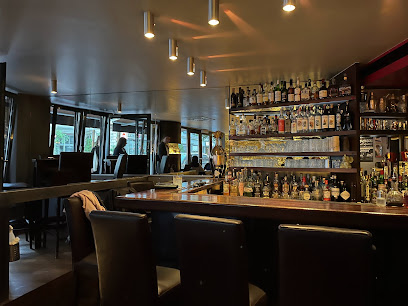
Unter Deck
Experience Munich's vibrant nightlife at Unter Deck, a stylish bar perfect for cocktails, music, and mingling in the heart of the city.
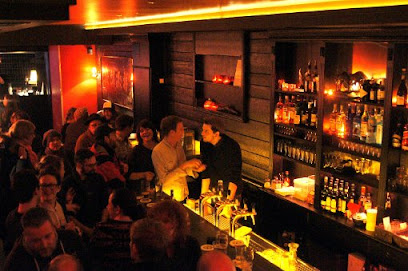
Zum Wolf
Experience the essence of Munich's cocktail scene at Zum Wolf, where handcrafted drinks and a chic atmosphere create unforgettable nights.
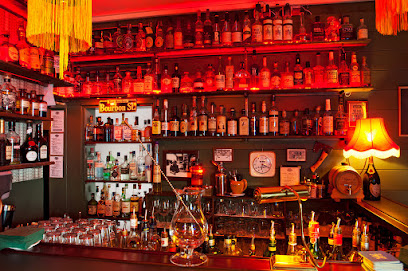
Fox Bar
Discover the vibrant nightlife of Fox Bar in Munich, where great drinks and a lively atmosphere create unforgettable memories.
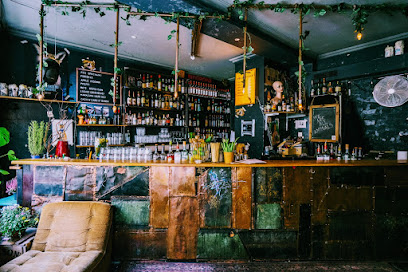
Cole & Porter Bar
Discover the lively atmosphere of Cole & Porter Bar, where handcrafted cocktails and delicious bites await in the heart of Munich.
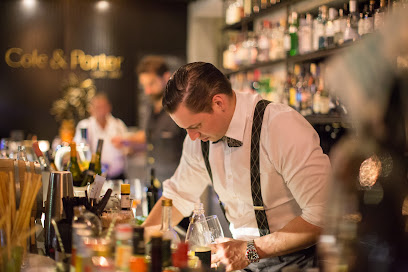
Cafe Bar Shakespeare
Experience the vibrant atmosphere and exquisite cocktails at Cafe Bar Shakespeare in Munich's lively Maxvorstadt district.
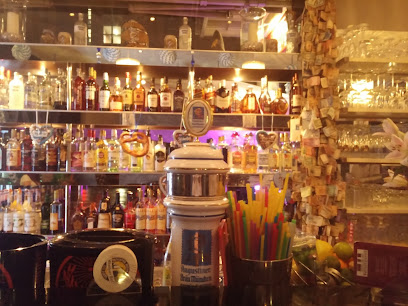
Ory Bar
Experience the vibrant nightlife of Munich at Ory Bar, where unique cocktails and a chic atmosphere await every visitor.
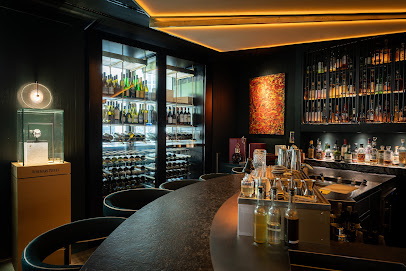
Barroom
Discover the vibrant nightlife of Munich at Barroom, where innovative cocktails and lively atmosphere create unforgettable experiences.
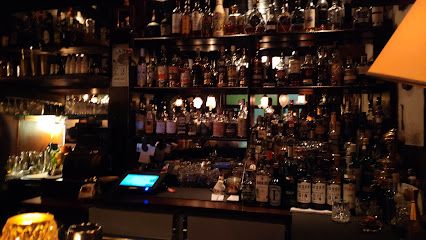
Local Phrases
-
- HelloServus
[Zer-voos] - GoodbyeAuf Wiedersehen
[Owf Vee-der-zay-en] - YesJa
[Yah] - NoNein
[Nine] - Please/You're welcomeBitte
[Bit-teh] - Thank youDanke
[Dahn-keh] - Excuse me/SorryEntschuldigung
[Ent-shool-di-gung] - How are you?Wie geht es dir?
[Vee gayt es deer?] - Fine. And you?Mir geht's gut. Und dir?
[Meer gayts goot. Oond deer?] - Do you speak English?Sprichst du Englisch?
[Spreekhst doo Eng-lish?] - I don't understandIch verstehe nicht
[Ikh fer-shtay-eh nikht]
- HelloServus
-
- I'd like to see the menu, pleaseIch hätte gerne die Speisekarte, bitte
[Ikh hett-eh ge-rne dee Shpy-suh-kahr-teh, bit-teh] - I don't eat meatIch esse kein Fleisch
[Ikh ess-eh kine Flysh] - Cheers!Prost!
[Prohst] - I would like to pay, pleaseIch möchte bitte zahlen
[Ikh merk-teh bit-teh tsah-len]
- I'd like to see the menu, pleaseIch hätte gerne die Speisekarte, bitte
-
- Help!Hilfe!
[Hil-feh] - Go away!Geh weg!
[Gay vekh] - Call the Police!Rufen Sie die Polizei!
[Roo-fen zee dee Po-lee-tsy] - Call a doctor!Rufen Sie einen Arzt!
[Roo-fen zee I-nen Arts] - I'm lostIch habe mich verirrt
[Ikh hah-beh meekh feh-reert] - I'm illIch bin krank
[Ikh been krank]
- Help!Hilfe!
-
- I'd like to buy...Ich möchte ... kaufen
[Ikh merk-teh ... kow-fen] - I'm just lookingIch schaue nur
[Ikh shau-eh noor] - How much is it?Wie viel kostet es?
[Vee feel kohs-tet es] - That's too expensiveDas ist zu teuer
[Dahs ist tsoh toy-er] - Can you lower the price?Können Sie den Preis senken?
[Ker-nen zee den price zeng-ken]
- I'd like to buy...Ich möchte ... kaufen
-
- What time is it?Wie spät ist es?
[Vee shpayt ist es] - It's one o'clockEs ist ein Uhr
[Es ist iyn oor] - Half past (10)Halb (10)
[Halb (10)] - MorningMorgen
[Mor-gen] - AfternoonNachmittag
[Nahkh-mit-tahg] - EveningAbend
[Ah-bent] - YesterdayGestern
[Ges-tern] - TodayHeute
[Hoy-teh] - TomorrowMorgen
[Mor-gen] - 1Eins
[Iyns] - 2Zwei
[Tsvay] - 3Drei
[Dry] - 4Vier
[Feer] - 5Fünf
[Fuhnf] - 6Sechs
[Zeks] - 7Sieben
[Zee-ben] - 8Acht
[Akh-t] - 9Neun
[Noy-n] - 10Zehn
[Tsen]
- What time is it?Wie spät ist es?
-
- Where's a/the...?Wo ist ein/der...?
[Vo ist iyn/dehr] - What's the address?Was ist die Adresse?
[Vas ist dee Ah-dreh-seh] - Can you show me (on the map)?Können Sie mir das zeigen (auf der Karte)?
[Ker-nen zee meer dass tsee-gen (ouf dehr Kar-teh)] - When's the next (bus)?Wann kommt der nächste (Bus)?
[Vann kohmt dehr nekh-ste (Boos)] - A ticket (to ....)Eine Fahrkarte (nach ....)
[I-nuh Fahr-kar-teh (nakh)]
- Where's a/the...?Wo ist ein/der...?
History of Munich
-
Munich, or München in German, was officially founded in 1158. The city was established by Henry the Lion, Duke of Bavaria, who built a bridge over the Isar River to collect tolls from the salt trade. This strategic move initiated the growth of Munich as a significant economic center.
-
From 1255, Munich became the ducal residence of the Wittelsbach family, who ruled Bavaria for several centuries. Their influence is still evident in the city's architecture and cultural heritage, particularly in landmarks such as the Alter Hof and the Residenz Palace.
-
In the mid-14th century, Munich, like much of Europe, was ravaged by the Black Death. The plague significantly reduced the population and had a lasting impact on the city's development. Despite this, Munich recovered and continued to grow in importance.
-
During the Renaissance, Munich flourished as a center of arts and culture. Duke Albrecht V established a court library, which later became the Bavarian State Library, and the city's architecture saw the addition of stunning Renaissance buildings such as the Michaelskirche.
-
The Thirty Years' War (1618-1648) brought significant turmoil to Munich. The city was occupied by Swedish troops in 1632. Despite the hardships, Munich emerged resilient, and the end of the war marked the beginning of a period of reconstruction and growth.
-
In 1623, Munich became the capital of the newly established Electorate of Bavaria. This elevated status brought increased political and cultural significance to the city, leading to the construction of imposing baroque buildings and churches, such as the Frauenkirche.
-
In the late 19th century, Munich became a hub for artistic innovation with the Munich Secession, a movement that sought to break away from traditional academic art. This period saw the rise of artists like Franz von Stuck and the establishment of the Lenbachhaus gallery.
-
Munich played a crucial role during the tumultuous years of World War I and the subsequent Weimar Republic. The city was the birthplace of the Nazi Party, and the infamous Beer Hall Putsch in 1923 was a failed coup attempt by Adolf Hitler and his followers.
-
During World War II, Munich suffered extensive bombing raids that destroyed much of the city. In the post-war years, Munich underwent significant reconstruction, transforming into a modern city while preserving its historical heritage. The 1972 Summer Olympics held in Munich marked a significant milestone in its recovery.
-
Munich is renowned for its vibrant cultural scene and the world-famous Oktoberfest, which began in 1810 to celebrate the marriage of Crown Prince Ludwig to Princess Therese. Today, Oktoberfest is the largest beer festival in the world, attracting millions of visitors annually.
-
In contemporary times, Munich is a thriving metropolis known for its high quality of life, technological innovation, and rich cultural heritage. It is home to major corporations like BMW and Siemens, and boasts a dynamic arts scene, with numerous museums, theaters, and music venues.
Munich Essentials
-
Munich is well-connected internationally and domestically. The primary airport is Munich Franz Josef Strauss International Airport (MUC), located about 28.5 kilometers northeast of the city center. The airport serves numerous international and domestic flights daily. From the airport, you can take the S-Bahn (S1 or S8) directly to the city center, which takes around 40 minutes. Munich is also accessible by train, with Deutsche Bahn (DB) services connecting it to major German cities and neighboring countries. The central train station, München Hauptbahnhof, is centrally located and a key hub for regional, national, and international trains. Additionally, long-distance buses operated by companies like FlixBus serve Munich from various European cities.
-
Munich boasts an efficient and extensive public transportation system operated by MVV, which includes U-Bahn (subway), S-Bahn (commuter trains), trams, and buses. The system is highly integrated, allowing for seamless transfers between different modes of transport. Tickets are valid across all modes of transport and can be purchased at ticket machines, online, or via the MVV app. For tourists, the Munich CityTourCard or the München Card provides unlimited travel within the city and discounts on attractions. Additionally, cycling is a popular and safe way to explore Munich, with many bike rental services available. Taxis and ride-sharing services like Uber are also readily available.
-
The official currency in Munich is the Euro (€). Credit and debit cards are widely accepted, especially Visa and MasterCard, but it is advisable to carry some cash for small purchases or in case you visit establishments that do not accept cards. ATMs are plentiful throughout the city, and many offer multilingual interfaces. Currency exchange offices are available at the airport, main train station, and in various locations around the city. It's wise to inform your bank of your travel plans to avoid any issues with card usage.
-
Munich is considered one of the safest cities in Germany, but like any major city, it is important to stay vigilant. Petty crimes like pickpocketing can occur, particularly in crowded areas such as Marienplatz, the main train station, and during major events like Oktoberfest. The neighborhoods of Hauptbahnhof and certain parts of the city center can be less safe at night, so exercise caution and avoid isolated areas after dark. Always keep an eye on your belongings and be cautious when approached by strangers asking for help or offering unsolicited services.
-
In case of emergency, dial 112 for fire and medical emergencies, or 110 for the police. These numbers are toll-free and can be dialed from any phone. Munich has several hospitals and clinics that provide high-quality care. The largest emergency hospital is Klinikum der Universität München. Pharmacies (Apotheke) are widespread and often have a sign with a green cross. In case of a medical emergency, look for a pharmacy with 'Notdienst' or 'Bereitschaftsdienst' indicating they are open outside regular hours. It is advisable to have travel insurance that covers medical emergencies and to carry a copy of your insurance policy.
-
Fashion: Do dress smart-casual when dining out or attending cultural events. Don't wear beachwear or very casual attire when visiting churches or formal settings. Religion: Do respect religious customs, especially in churches. Dress modestly and remain quiet. Public Transport: Do validate your ticket before boarding. Don't put your feet on seats or eat and drink on public transport. Greetings: Do greet people with a firm handshake and make eye contact. Don't use first names unless invited to do so. Eating & Drinking: Do try local specialties like Weißwurst and Brezen. Don't clink glasses when toasting with non-alcoholic beverages, as it is considered bad luck.
-
To experience Munich like a local, visit the Viktualienmarkt for fresh produce and local delicacies. Take a stroll or bike ride through the Englischer Garten, one of the largest urban parks in the world. Try a Maß of beer at a traditional beer garden like Augustiner-Keller or Hofbräuhaus. For a unique cultural experience, attend a Bayern Munich football match at the Allianz Arena. Explore lesser-known neighborhoods like Giesing or Haidhausen for a more authentic Bavarian experience. Participate in local festivals such as Starkbierfest in March or the Auer Dult fairs.
Nearby Cities to Munich
-
Things To Do in Innsbruck
-
Things To Do in Kitzbühel
-
Things To Do in Salzburg
-
Things To Do in Zell am See
-
Things To Do in St. Anton am Arlberg
-
Things To Do in Nuremberg
-
Things To Do in Bregenz
-
Things To Do in Dornbirn
-
Things To Do in Bad Gastein
-
Things To Do in Hallstatt
-
Things To Do in Rothenburg ob der Tauber
-
Things To Do in Schellenberg
-
Things To Do in Ruggell
-
Things To Do in Mauren
-
Things To Do in Eschen


















